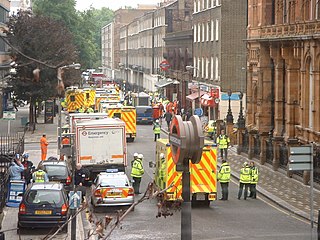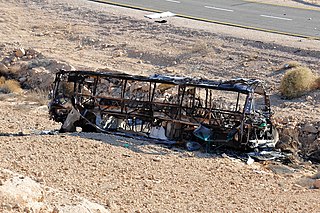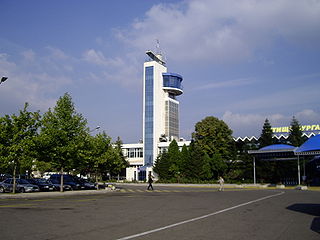Related Research Articles

A car bomb, bus bomb, van bomb, lorry bomb, or truck bomb, also known as a vehicle-borne improvised explosive device (VBIED), is an improvised explosive device designed to be detonated in an automobile or other vehicles.

The Tarata bombing, known also as the Miraflores bombing or Lima bombing, was a terrorist attack carried out in Tarata Street, located in Miraflores District of Lima, Peru, on 16 July 1992, by the leftist Shining Path terrorist group. The blast was one of the deadliest Shining Path bombings during the Internal conflict in Peru and was part of a larger bombing campaign in the city during the last stage of the terrorism era.

The 7 July 2005 London bombings, also referred to as 7/7, were a series of four co-ordinated suicide attacks carried out by Islamist terrorists that targeted commuters travelling on London's public transport during the morning rush hour.
Operation Bayonet was a covert operation directed by Mossad to assassinate individuals they accused of being involved in the 1972 Munich massacre. The targets were members of the Palestinian armed militant group Black September and operatives of the Palestine Liberation Organisation (PLO). Authorised by Israeli Prime Minister Golda Meir in the autumn of 1972, the operation is believed to have continued for over twenty years. While Mossad killed several prominent Palestinians during the operation, they never managed to kill the mastermind behind Munich, namely Abu Daoud.
Events in the year 1988 in Israel.

On August 18, 2011, a series of cross-border attacks with parallel attacks and mutual cover was carried out in southern Israel on Highway 12 near the Egyptian border by a squad of presumably twelve militants in four groups. The attacks occurred after Israel's interior security service Shin Bet had warned of an attack by militants in the region and Israeli troops had been stationed in the area. The militants first opened fire at an Egged No. 392 bus as it was traveling on Highway 12 in the Negev near Eilat. Several minutes later, a bomb was detonated next to an Israeli army patrol along Israel's border with Egypt. In a third attack, an anti-tank missile hit a private vehicle, killing four civilians. Eight Israelis – six civilians, one Yamam special unit police sniper and one Golani Brigade soldier—were killed in the multiple-stage attack. The Israel Defense Forces reported eight attackers killed, and Egyptian security forces reported killing another two.
This is a list of terrorist attacks in Pakistan in the calendar year 2011.
In 2009, Pakistan suffered 50 terrorist, insurgent and sectarian-related incidents that killed 180 people and injured 300.
The 2012 attacks on Israeli diplomats occurred on 13 February 2012 after a bomb explosion on an Israeli diplomatic car in New Delhi, India, wounding one embassy staff member, a local employee and two passers-by. Another bomb planted in a car in Tbilisi, Georgia failed to explode and was defused by Georgian police.

The 2012 Burgas bus bombing was a terrorist attack carried out by a suicide bomber on a passenger bus transporting Israeli tourists at the Burgas Airport in Burgas, Bulgaria, on 18 July 2012. The bus was carrying 42 Israelis, mainly youths, from the airport to their hotels, after arriving on a flight from Tel Aviv. The explosion killed the Bulgarian bus driver and five Israelis and injured 32 Israelis, resulting in international condemnation of the bombing.

Many terrorist attacks have occurred in Kenya during the 20th and 21st centuries. In 1980, the Jewish-owned Norfolk hotel was attacked by the Palestine Liberation Organization (PLO). In 1998, the US embassy was bombed in Nairobi, as was the Israeli-owned Paradise hotel in 2002 in Mombasa. In 2013, the Somali jihadist group al-Shabaab killed 67 people at Nairobi's Westgate Shopping Mall. There have also been many other attacks.

Terrorism in France refers to the terrorist attacks that have targeted the country and its population during the 20th and 21st centuries. Terrorism, in this case is much related to the country's history, international affairs and political approach. Legislation has been set up by lawmakers to fight terrorism in France.
Terrorism in Ecuador is a rare occurrence as the country, despite recurrent periods of economic and political instability, has been traditionally known as a peaceful state in Latin America, unlike its neighbor states; Peru and Colombia, which have suffered widespread violence by insurgent, paramilitary and drug trafficking organizations in different degrees for more than fifty years.
On 31 May 2017, a truck bomb exploded at a crowded intersection in Kabul, Afghanistan, near the German embassy at about 08:25 local time during rush hour, killing over 150 and injuring 413, mostly civilians, and damaging several buildings in the embassy. The attack was the deadliest terror attack to take place in Kabul. The diplomatic quarter—in which the attack took place—is one of the most heavily fortified areas in the city, with three-meter-high (10 ft) blast walls, and access requiring passing through several checkpoints. The explosion created a crater about 4.5 meters (15 ft) wide and 30 feet deep. Afghanistan's intelligence agency NDS claimed that the blast was planned by the Haqqani Network. Although no group has claimed responsibility, the Afghan Taliban were also a suspect but they denied involvement and condemned the attack. It was the single largest attack on the city up till that point.

On 23 November 2022, two bomb attacks were carried out at bus stops on the outskirts of Jerusalem. Two civilians were killed and 46 were injured. They were the first bombings carried out on Israeli civilians since the 2016 Jerusalem bus bombing, in which a suicide bomber injured at least 22 people.
References
- ↑ Rubin, Barry; Rubin, Judith Colp (2015). Chronologies of Modern Terrorism. Routledge. p. 202. ISBN 9781317474654.
- 1 2 3 4 "3 Dead in Explosion of Car Bomb Near Israel's Embassy in Cyprus". The New York Times. 12 May 1988.
- ↑ "Car Bomb Kills Three People Near Israeli Embassy In Cyprus". Associated Press. 11 May 1988.